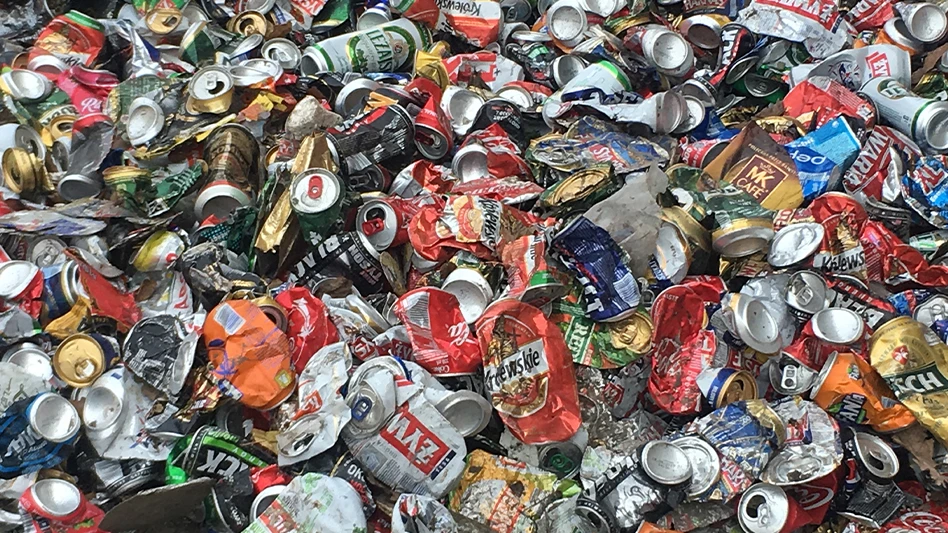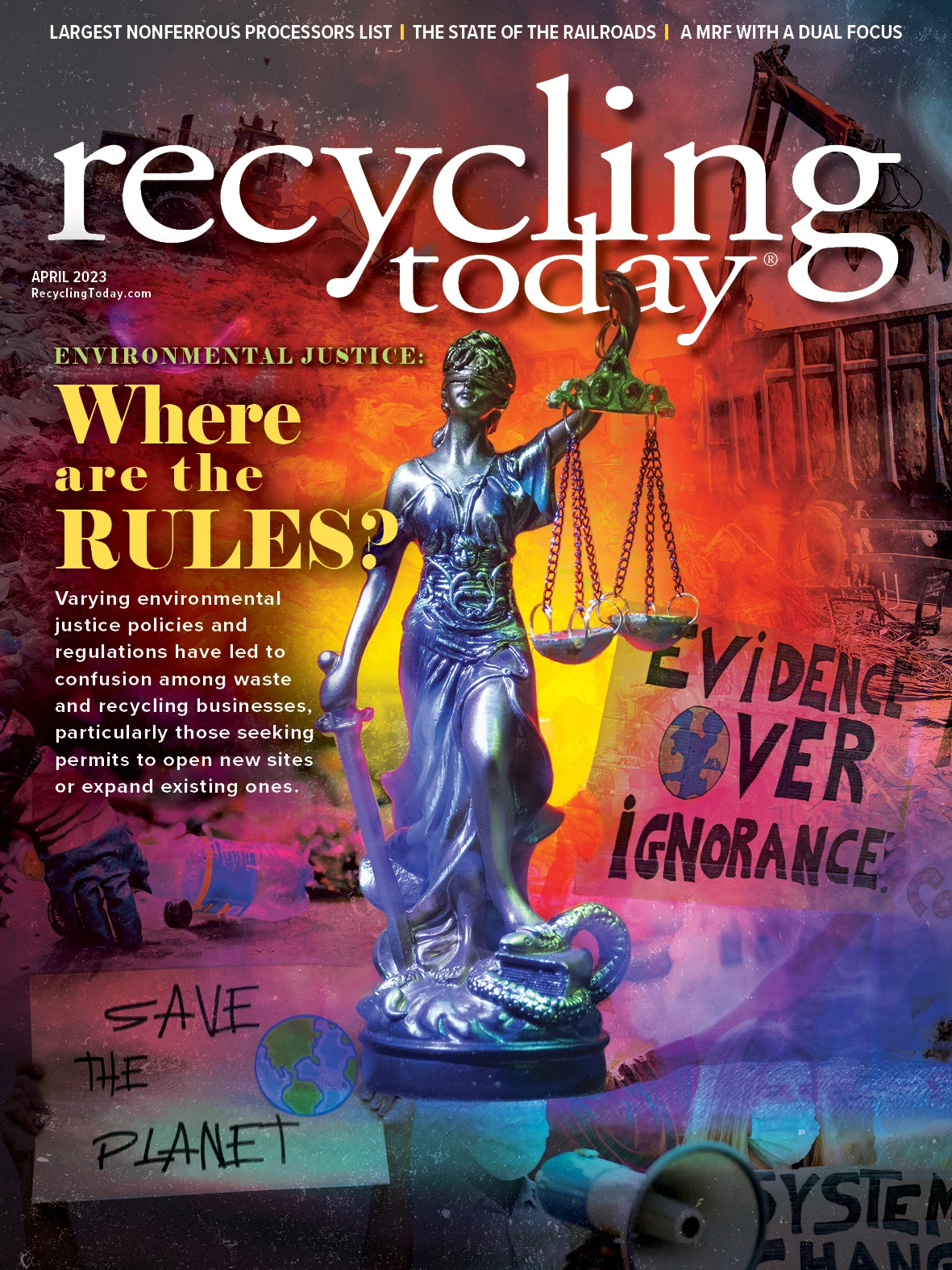
Recycling Today archives

The amount of attention the European Union (EU) pays to a circular and “green” economy would seem to work in favor of recycling companies in Europe, but in the case of some pending and proposed regulations, cynicism could instead move to the forefront.
Recycling organizations in the EU, many of which band together to form the Brussels-based European Recycling Industries’ Confederation (EuRIC), are concerned particularly about proposed changes to the misnamed waste shipment regulatory framework.
EuRIC Secretary General Emmanuel Katrakis tells Recycling Today the proposed changes are shaping up to be catastrophic for buyers and sellers of environmentally safe, high-value scrap materials that would be regulated as unwanted “waste” if some proposed amendments are enacted.
The looming iceberg
Scrap commodity traders can make a multidecade statistical case that they connect highly willing buyers and sellers of such materials whether they are a short truck drive or a transoceanic voyage away from each other.
When objections to cross-border trade have been raised, often the culprit is a scrap-consuming sector (producers of steel, aluminum or paper, for example) that is losing out on feedstock to overseas buyers willing to bid more for material.
More recently, nongovernmental organizations (NGOs) also have objected, claiming shipments from nations in the Organization for Economic Cooperation and Development (OECD) sent to non-OECD nations present a risk of exporting hazardous materials.
The OECD has 38 member nations consisting of countries with some of the most developed, highest-income economies, including most EU member nations. Non-OECD countries might not be as economically developed, but many are striving to industrialize and urbanize, which includes boosting their manufacturing and basic materials sectors.
Some combination of NGOs willing to characterize all secondary commodities as waste and European basic material producers wanting to keep more scrap close to home helped draft the revised standards that sailed through the European Parliament in mid-January in a 594-48 vote.
Brussels-based Euractiv.com reported that one Polish member of Parliament said, “We should be ashamed of exporting our waste to simply get rid of it.”
That motive to ship highly desirable (and often high-priced) merchandise is likely a surprise to established traders.
If the regulatory changes are enacted as envisioned, overseas buyers of copper, aluminum, steel, stainless steel, paper and cardboard scrap in non-OECD countries will have to go through considerable procedures (involving one or more governments) to purchase materials from the EU.
Speaking in February at a recycling conference in India, Katrakis said to ship outside the OECD, EU recyclers could need permission from the receiving party’s government, and the processors or consumers receiving material could be subject to audits designed to assure EU regulators the scrap will be properly handled. Katrakis said plastic scrap shipments could be banned altogether.
Metal recycling hurdles make little sense in a global effort to reduce CO2 or greenhouse gas emissions, Katrakis said. No matter where in the world the melt shop is located, EuRIC cites 92 percent CO2 savings from using scrap versus virgin ores in the case of aluminum, 65 percent in the case of copper and 58 percent in the case of steel.
Marc Ehrlich of Switzerland-based Vipa Group, one of the largest recovered paper trading firms in the world, said to attendees of the 2022 Paper & Plastics Recycling Conference Europe that the looming changes are unclear but likely harmful to those sectors.
He added that the amendments do not entail a ban on exporting paper and plastic scrap, but the materials “will become much more difficult to export.”
As it is written currently, the new regulation would ask a nation receiving recovered paper from Europe, such as India, to “demonstrate it has a recycling system similar to Europe,” Ehrlich said. However, there is little clarity as to who makes the assessments of overseas systems or what a notional audit would look like. “We don’t have the criteria at the moment,” Ehrlich said last November.
He added that improperly discarded plastic (and its low recycling rate) has been the primary motivator for the changes. “They have only plastic in mind,” Ehrlich said of EU regulators and members of parliament.
He urged recycling associations to concede that plastic shipments will be subject to the amendments and instead to focus on salvaging metals and paper trading. “Take out the nonproblematic materials: recovered paper and metals,” Ehrlich said. “Sorry, but plastic will not be well-received.”
With the resounding Parliament vote in favor of the revisions, any hope to stave off some or all of the amendments lies at the national level. “The law is now ready to enter the final stages of adoption, with talks to be scheduled later this year between the European Parliament and EU member states to finalize the text,” Euractiv reported in January.
Brakes have been applied to EU proposals in this manner, with one example occurring in March when Germany and Italy lobbied for exemptions to a wider EU plan to ban the production of all internal combustion engine passenger vehicles by 2035.

Circles supported or interrupted?
Several EU nations, including Germany and the Netherlands, can be considered pacesetters in their ability to recycle discarded packaging. Nonetheless, last November, the European Commission (EC) proposed new rules on packaging for the EU designed to prevent any potential rise in “packaging waste.”
Proposed revisions to an existing EU directive set a target to reduce packaging waste by 15 percent by 2040 per member state per capita, using 2018 as a baseline. Although increased recycling activity is noted as a positive impact of the revisions, packaging reduction also is emphasized.
The EC lists single-use packaging for food and beverages when consumed inside restaurants and cafes, single-use packaging for fruits and vegetables, miniature shampoo bottles and other miniature packaging in hotels as items to be prohibited. Companies also will have to offer a certain percentage of their products to consumers in reusable or refillable packaging.
Perhaps more welcome news for recyclers are measures designed to make packaging fully recyclable by 2030. This includes setting design criteria for packaging, creating mandatory deposit return systems for plastic bottles and aluminum cans and making it clear which packaging is compostable so users place those items in their organics collection stream.
The revisions also call for mandatory recycled content in packaging, ranging from 10 percent to 35 percent, depending on the packaging application.
UNESDA, a Brussels-based organization representing soft drink companies, expresses doubt whether some of the revisions will help what it considers to be already good closed-loop recycling systems for beverage containers.
In particular, the organization says it fears the potential and unintended interruption of the growing polyethylene terephthalate (PET) bottle-to-bottle recycling sector in Europe. “This legislation needs to urgently address the issue of downcycling of food-grade materials into nonfood-grade applications,” UNESDA says. “It currently fails to include a priority access mechanism or right of first refusal that grants fairer access to the necessary amount of recycled content to those sectors that are required to use food-grade materials to comply with EU food safety requirements.
“This is a key enabler for further promoting closed-loop recycling while preventing downcycling of food-grade recycled materials. Sectors that are not required to use food-grade materials must also be incentivized to invest in efficient collection and recycling systems that can achieve true circularity for their own products,” UNESDA adds.
The Brussels-based European Waste Management Association (FEAD) gives a general endorsement of the revisions, however. “The Commission’s proposed new regulation shows a strong willingness to close the loop in the packaging sector,” FEAD President Peter Kurth says. “Our pivotal role along the whole chain of products to waste in making the European economy more circular is being valued.”
While details of the revisions could yield surprises, FEAD sees one aspect as critical, saying in December, “The proposed measures, such as mandatory recycled content, aim at creating the very much-needed shock on demand for recyclates and, therefore, trigger investments in separate collection, sorting and highly innovative recycling.”

Explore the April 2023 Issue
Check out more from this issue and find your next story to read.
Latest from Recycling Today
- Orion ramping up Rocky Mountain Steel rail line
- Proposed bill would provide ‘regulatory clarity’ for chemical recycling
- Alberta Ag-Plastic pilot program continues, expands with renewed funding
- ReMA urges open intra-North American scrap trade
- Axium awarded by regional organization
- Update: China to introduce steel export quotas
- Thyssenkrupp idles capacity in Europe
- Phoenix Technologies closes Ohio rPET facility





